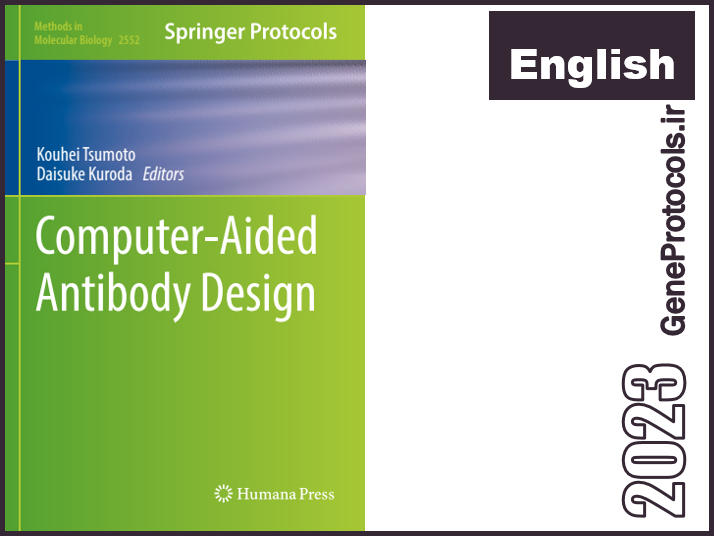-
قابل دانلود از جمعه, ۲۲ ارديبهشت ۱۴۰۲
|
فهرست مطالب: Preface . . . . . . . . . . . . . . vContributors . . . . . . . . . . . . . . . xi PART I INFORMATION OF ANTIBODY SEQUENCES AND STRUCTURES 1 Antibody Sequence and Structure Analyses Using IMGT®: 30 Years of Immunoinformatics . . . . . . . . 3 Marie-Paule Lefranc and Ge´rard Lefranc 2 Structural Classification of CDR-H3 in Single-Domain VHH Antibodies . 61 Daisuke Kuroda and Kouhei Tsumoto PART II MODELING ANTIBODY STRUCTURES AND DYNAMICS 3 Computational Modeling of Antibody and T-Cell Receptor (CDR3 Loops) . . . . . . . . . 83 Frederikke I. Marin and Paolo Marcatili 4 Molecular Dynamics Simulation for Investigating Antigen–Antibody Interaction . . . . . . . . . 101 Takefumi Yamashita 5 Molecular Dynamics Methods for Antibody Design . . . . . 109 Matthew Carter Childers and Valerie Daggett 6 Probing Conformational Dynamics of Antibodies with Geometric Simulations . . . . . . . . . . . 125 Andrejs Tucs, Koji Tsuda, and Adnan Sljoka PART III PREDICTION AND OPTIMIZATION OF BIOLOGICAL AND BIOPHYSICAL PROPERTIES OF ANTIBODIES 7 PITHA: A Webtool to Predict Immunogenicity for Humanized and Fully Human Therapeutic Antibodies . . . . . . . . . 143 Shide Liang and Chi Zhang 8 Thermal Stability Estimation of Single Domain Antibodies Using Molecular Dynamics Simulations . . . . . . 151 Gert-Jan Bekker and Narutoshi Kamiya 9 Assessing and Engineering Antibody Stability Using Experimental and Computational Methods . . . . . . . . . . 165 Cheng Zhang and Paul Anthony Dalby 10 In Silico Prediction Method for Protein Asparagine Deamidation . . . 199 Lei Jia and Yaxiong Sun viiviii Contents 11 Structure-Based Optimization of Antibody-Based Biotherapeutics for Improved Developability: A Practical Guide for Molecular Modelers . . . . . . . . . . 219 Nels Thorsteinson, Stephen R. Comeau Jr, and Sandeep Kumar PART IV PREDICTION OF ANTIBODY-ANTIGEN INTERACTIONS 12 B-Cell Epitope Predictions Using Computational Methods . . . 239 Dandan Zheng, Shide Liang, and Chi Zhang 13 Computational Epitope Prediction and Design for Antibody Development and Detection . . . . . . . . . . 255 Riccardo Capelli, Stefano A. Serapian, and Giorgio Colombo 14 Information-Driven Antibody–Antigen Modelling with HADDOCK . . . . 267 Francesco Ambrosetti, Zuzana Jandova, and Alexandre M. J. J. Bonvin 15 Structural Modeling of Adaptive Immune Responses to Infection . . . 283 Tina Lusiany, Zichang Xu, Dianita S. Saputri, Hendra S. Ismanto, Sedat Aybars Nazlica, and Daron M. Standley 16 Protein–Protein Interaction Modelling with the Fragment Molecular Orbital Method . . . . . . . . . . . . 295 Shigenori Tanaka PART V COMPUTER-AIDED ANTIBODY AFFINITY MATURATION AND BEYOND 17 Structural Considerations in Affinity Maturation of Antibody-Based Biotherapeutic Candidates . . . . . . . . . . . . 309 Stephen R. Comeau, Nels Thorsteinson, and Sandeep Kumar 18 Structure-Based Affinity Maturation of Antibody Based on Double-Point Mutations . . . . . . . . . . . 323 Shuntaro Chiba, Yasushi Okuno, and Masateru Ohta 19 Antibody Affinity Maturation Using Computational Methods: From an Initial Hit to Small-Scale Expression of Optimized Binders . . . . . . 333 Barbara Medagli, Miguel A. Soler, Rita De Zorzi, and Sara Fortuna 20 Optimizing Antibody–Antigen Binding Affinities with the ADAPT Platform . . . . . . . . . . . . 361 Traian Sulea, Christophe Deprez, Christopher R. Corbeil, and Enrico O. Purisima 21 Using Graph-Based Signatures to Guide Rational Antibody Engineering . 375 David B. Ascher, Lisa M. Kaminskas, Yoochan Myung, and Douglas E. V. Pires 22 A Computational Framework for Determining the Breadth of Antibodies Against Highly Mutable Pathogens . . . . . . . 399 Simone Conti and Martin KarplusContents ix 23 Analytical Method for Experimental Validation of Computer-Designed Antibody . . . . . . . . . . . 409 Aki Tanabe and Kouhei Tsumoto PART VI SYNTHETIC ANTIBODY LIBRARY, NEXT GENERATION SEQUENCING OF B-ELL REPERTOIRES AND IMMUNOTHERAPY 24 Computational Analysis of Antibody Paratopes for Antibody Sequences in Antibody Libraries . . . . . . . 437 Hung-Pin Peng and An-Suei Yang 25 Bioinformatic Analysis of Natively Paired VH:VL Antibody Repertoires for Antibody Discovery . . . . . . . . . . 447 Ahmed S. Fahad, Bharat Madan, and Brandon J. DeKosky 26 Analyzing Antibody Repertoire Using Next-Generation Sequencing and Machine Learning . . . . . . . . . . . 465 Shuto Hayashi and Shumpei Ishikawa 27 A Computational Pipeline for Predicting Cancer Neoepitopes . . . . . . 475 Anna-Lisa Schaap-Johansen and Paolo Marcatili Index . . . . . . . . . . . . . . . 489 مشخصات فایل |
|
| عنوان (Title): | Computer-Aided Antibody Design |
| نام فایل (File name): | 955-www.GeneProtocols.ir-Computer-Aided Antibody Design-Humana Press (2022).pdf |
| عنوان فارسی (Title in Persian): |
طراحی آنتی بادی به کمک کامپیوتر
|
| ایجاد کننده: | Kouhei Tsumoto, Daisuke Kuroda |
| زبان (Language): | انگلیسی English |
| سال انتشار: | 2022 |
| شابک ISBN: | 1071626086, 9781071626085 |
| نوع سند (Doc. type): | کتاب |
| فرمت (File extention): | |
| حجم فایل (File size): | 21.6 مگابایت |
| تعداد صفحات (Book length in pages): | 481 |
پس از پرداخت، دانلود فایل آغاز می شود
درباره درگاه پرداخت نکست پی بیشتر بدانید
برچسب ها:
2022,
آنتی بادی,
انگلیسی,
ایمونولوژی,
بیوانفورماتیک,
سیستم ایمنی,
پروتکل بیوشیمی,
پروتکل پزشکی,
تمامی درگاه های پرداخت ژنـ پروتکل توسط شرکت دانش بنیان نکست پی پشتیبانی می شود. نکست پی دارای مجوز رسمی پرداختیاری به شماره 1971/ص/98 ، از شرکت شاپرک و بانک مرکزی جمهوری اسلامی ایران و دارای نماد اعتماد در حوزه (متمرکزکنندگان پرداخت) از مرکز توسعه تجارت الکترونیکی وزارت صنعت معدن و تجارت است.




